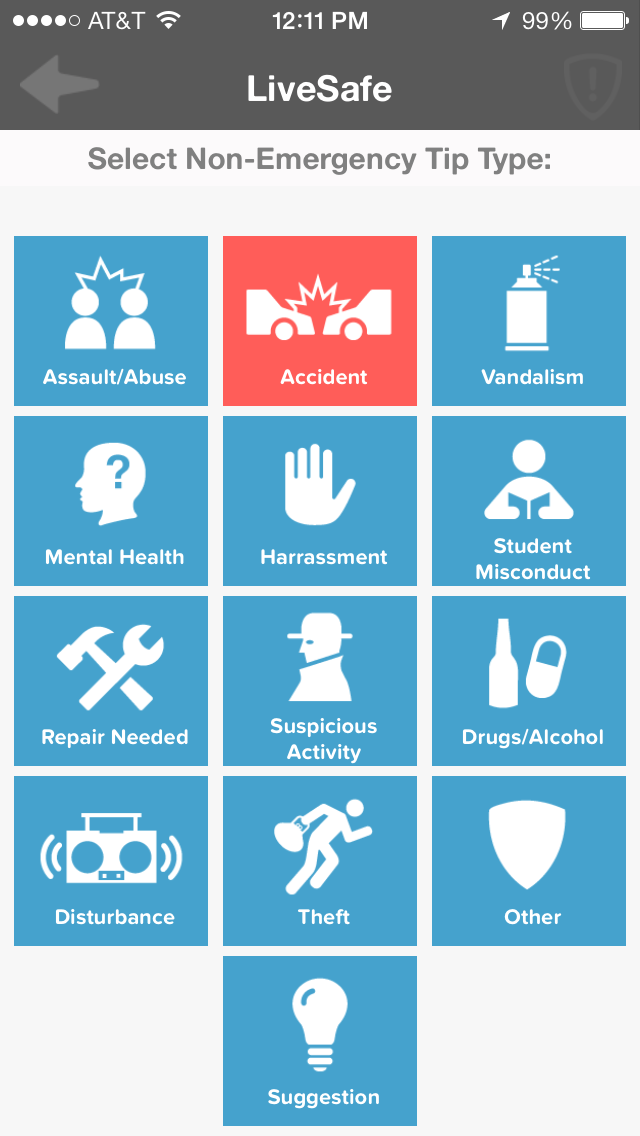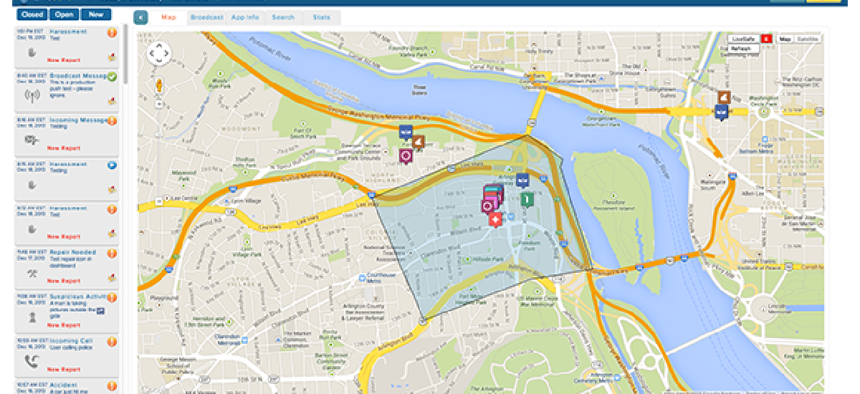Connecting state and local government leaders
LiveSafe makes reporting suspicious activity easier and gives safety officials a multilayer platform to increase safety awareness.
One way to protect campuses, federal buildings and military bases is to add cameras and sensors to scan for anything out of place. But even the most advanced camera can’t interpret nuanced behavior − like sexual harassment or a soldier who is becoming severely depressed − the way humans can. And humans can’t always get that information to people most able to do something about it.
LiveSafe mobile interface
 Click to enlarge.
Click to enlarge.
LiveSafe users can submit anonymous tips, photos and videos using their smartphones.
That's the idea behind the LiveSafe app, that makes reporting suspicious activity − an accident or a fire, or anything out of the ordinary − as simple as tapping the appropriate button on the app's main screen and adding relevant details. LiveSafe then communicates the information to the appropriate authorities, allowing organizations to streamline workflows and increase collaboration between emergency services departments.
LiveSafe has already been deployed at Virginia Commonwealth University, the University of Baltimore, Savannah College of Art & Design, Spokane County Sheriff, City of Andalusia, several high schools in Northern Virginia, with many additional schools and communities signed up to launch in 2014.
While people can always call 911 in an emergency, LiveSafe can be especially helpful in reporting suspicious behavior, something that doesn't quite rise to the level of a 911 emergency or even low-level criminality like fresh graffiti or vandalism. Users can remain anonymous while they use their phones to take photos and video of the incident.
On the backend, campus or law enforcement officials will find that they have an entire dashboard where they can see all events reported within their domain. There is a real-time feed of events laid out over a map, with new events indicated by an audible chime and a flashing cell whose color is determined by the urgency.
It’s an intuitive dashboard that is easy to use, said company president and CEO Jenny Abramson. "The dashboard is browser-based and customizable by each individual admin. It’s been designed to be user-friendly, with minimal training required to begin using it," she said. "Each event contains the location of the submitter, and the admin has the ability to initiate and engage in a real-time chat with them. The admin is then able to create a report for each event, adding additional details and notes as necessary."
The reporting is powered by a database that uses representational state transfer (REST) Web services to populate the dashboard. Administrators have several options for displaying information for themselves, first responders and the app's users. The dashboard can make use of email, text and push notifications to share that data. The admin can also place points, geofences, building names and call-box locations on the map so that they are visible to all users within the app. In addition, the dashboard serves as a publishing platform that enables the agency to show multimedia information, documents and screens within the app. A user could be told to head to a certain building for example, given a map and even shown a picture of the front of the building.
LiveSafe can connect with existing emergency response systems and can display that information on the dashboard. The only requirement is that the linking systems need to have an API feed, which can be public or private.
Because LiveSafe connects with emergency services, security is in place to ensure that it can't compromise existing networks. All communication between the app, servers and the dashboard is sent using SSL encryption. Identification is then done via a hash-based message authentication code. This ensures that the device making the call is actually what it claims to be. On the other end, access to the dashboard is password-protected, and privileges within the dashboard are segmented so that administrators each have their own access-level profile.
While LiveSafe has been successful on college campuses and in several towns, Abramson said the company is also seeing interest from potential military users. "If every service member was a sensor that freely reported to command issues and concerns, it would enable the commanding officers to intervene early and quickly to prevent a catastrophe, a crime or breach of security,” she said.
Retired U.S. Air Force Lt. Gen. Dick Newton serves on the LiveSafe’s advisory board and said he finds LiveSafe can be an effective tool as a deterrent for bad behaviors, it can help prevent a crime or tragedy and it improves situational awareness for first responders. Moreover, he said, in a military setting, “LiveSafe provides a compelling solution to two of the most important issues our military face today − combating sexual assault/harassment and enhancing the prevention of suicide within the ranks.”
Leveraging the smartphones and the brains of people carrying them could eliminate more expensive, less mobile technologies like police call boxes and blue light emergency phones on college campuses and military bases.
"The typical police call box found on many military installations can cost up to $20,000 − and twice that much in maintenance costs over the lifespan. The cost for LiveSafe pales in comparison." Abramson said. "The boxes are also impractical because if you're in danger, it’s not always possible to run to the call box, dial for help and then wait there for help to arrive. With LiveSafe, the users can contact police from anywhere, instantly providing their name, contact info and location via GPS. If they are on the move, law enforcement can track them in real time and direct them to wherever they need to go to get away from danger."



